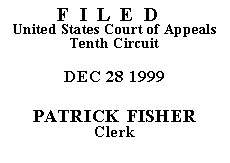

| UNITED STATES OF AMERICA,
Plaintiff-Appellee,
v.
JERRY YOUMANS and
MARC ALAN KOONS, Defendants-Appellants. |
Nos. 98-3328
98-3329
(D.C. Nos. 97-CR-10071-5
& 97-CR-10071-6 (Kansas) |
Pursuant to plea agreements, co-defendants Mr. Youmans and Mr. Koons pled guilty to conspiracy to distribute methamphetamine in violation of 21 U.S.C. § 846. They both appeal their sentences. Since the facts and the law are virtually identical in these cases, we have consolidated their appeals for disposition. We affirm.
In Mr. Youmans' plea agreement, the government agreed that if, in its sole discretion, it found his cooperation to be substantial, it would file a motion for downward departure from the U.S. Sentencing Guidelines. See Rec., Supp. vol. I, Doc. 209, Plea Agreement ¶ 2(b). Unsatisfied with Mr. Youmans' assistance, the government informed him less than an hour before his sentencing hearing that it would not be filing the motion. The district court denied Mr. Youmans' request for a continuance to review the government's reasons for not filing the motion.
Mr. Youmans argues the district court abused its discretion in denying the continuance. We review the denial of a request for a continuance for an abuse of discretion. See United States v. Garcia, 78 F.3d 1457, 1467 (10th Cir. 1996). A district court abuses its discretion to grant a continuance only if the denial is arbitrary and substantially impairs the defendant's opportunity to secure a fair sentence. See id.
The district court here did not grant a continuance because of prior continuances granted in the case, and because it recognized there was nothing legally it could do regarding the government's failure to file the motion for departure. See Rec., vol. II, doc. 294 at 13. Absent a breach of the plea agreement, the district court is correct that it cannot force prosecutors to file motions to depart. See Wade v. United States, 504 U.S. 181, 186 (1992).
The government breaches a plea agreement such as the one here when its decision not to file a motion for departure is animated by unconstitutional or illegitimate motives. See United States v. Courtois, 131 F.3d 937, 938 (10th Cir. 1997). Mr. Youmans does not argue that the government had an unconstitutional or illegitimate motive; rather, he argues the government's failure to give adequate notice resulted in the lack of an opportunity to show an illegitimate motive. After Mr. Youmans made this argument to the district court at the sentencing hearing, the government gave a detailed account of why it declined to move for a departure. See Rec., vol. II, doc. 294 at 10-12. Since the district court reviewed the government's motives, it did not abuse its discretion in denying Mr. Youmans a fuller opportunity to do the same.
Mr. Koons brings forth two issues for our review. He first argues the government breached its plea agreement with him by failing to forward a confidential memorandum to the district court describing his cooperation as promised in the plea agreement. See Rec., vol. I, doc. 216, Plea Agreement ¶ 2(b). Like Mr. Youmans, Mr. Koons also appeals the district court's failure to grant a continuance at the sentencing hearing.
Although Mr. Koons' counsel did not object to the lack of the confidential memorandum, we have held that failure to object to breach of a plea agreement does not waive the issue. See Courtois, 131 F.3d at 938 n.2. Whether a breach occurred is an issue we review de novo. See United States v. Belt, 89 F.3d 710, 712 (10th Cir. 1996).
Although the government did not file a confidential memorandum regarding the extent of Mr. Koon's cooperation, it did inform the sentencing court of Mr. Koons' cooperation in a prior hearing for continuance of his sentencing. See Rec., vol. IV, at 3-5. Mr. Koons has not stated that he provided any further cooperation of which the district court was not apprised. Thus, any breach by the government of the specific requirements of its plea agreement with Mr. Koons was harmless. See Beck, 89 F.3d at 713.
Regarding Mr. Koons' second argument, our disposition of Mr. Youmans' same complaint about the lack of a continuance applies equally to Mr. Koons. Mr. Koons' substantial rights were not affected by the failure of the district court to grant a continuance.
For the foregoing reasons, the sentences imposed by the district court in each of these cases are AFFIRMED.
ENTERED FOR THE COURT
Stephanie K. Seymour
Chief Judge
*.This order and judgment is not binding precedent, except under the doctrines of law of the case, res judicata, or collateral estoppel. The court generally disfavors the citation of orders and judgments; nevertheless, an order and judgment may be cited under the terms and conditions of 10th Cir. R. 36.3.